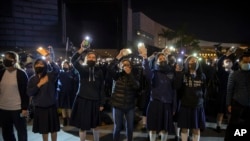The United States said on Wednesday that a decision by a Hong Kong court to ban a popular protest song called Glory to Hong Kong is the latest blow to the city's international reputation.
"We remain seriously concerned about the continued erosion of protections for human rights and fundamental freedoms in Hong Kong, including freedom of expression," State Department spokesperson Matthew Miller told reporters Wednesday during a press briefing.
"The decision to ban this song is the latest blow to the international reputation of a city that previously prided itself on having an independent judiciary protecting the free exchange of information, ideas and goods," Miller added.
On May 8, the Court of Appeal of the High Court of Hong Kong granted an application by the authorities to ban Glory to Hong Kong, overturning a lower court judgment that had rejected such a ban due to its potential "chilling effects" on free speech.
In Beijing, Chinese officials justified the ruling by Hong Kong’s Court of Appeal.
"Given its constitutional responsibility to safeguard national security and the dignity of the national anthem, it is only legitimate and necessary for the Hong Kong Special Administrative Region to stop anyone from using and disseminating relevant songs to incite secession and insult the national anthem," Lin Jian, a spokesperson of China’s Ministry of Foreign Affairs, said Wednesday.
A popular protest song
Glory to Hong Kong emerged as an anthem for protesters during the massive anti-government protests in 2019.
Judge Jeremy Poon sided in favor of the government in his ruling Wednesday, saying the composer intended for the song to be used as a "weapon."
The ban covers anyone who either broadcasts or distributes the song with the intention of promoting Hong Kong’s independence or misrepresents it as the city’s official anthem.
The song has mistakenly been played at sporting events as the official anthem of Hong Kong. The city does not have its own anthem, instead using mainland China’s official anthem, March of the Volunteers.
Judge Poon’s ruling overturned a previous decision issued last year by the High Court, which cited free speech concerns in its ruling. The government went to court last year to have the song banned after Google and other internet service providers refused to remove it from their search results.
The ban is the latest action taken by the government to silence dissenting voices since Beijing passed a sweeping security law for Hong Kong in 2020 in response to the protests. The law punishes anyone believed to be carrying out terrorism, separatism, subversion of state power or collusion with foreign forces.
Since the law took effect, hundreds of pro-democracy advocates have been arrested, tried and jailed, and the city’s once-vibrant civil society has been stifled.
Jimmy Lai Way
In April, a U.S. congressional resolution was proposed to rename the address of the Hong Kong Economic Trade Office in Washington "Jimmy Lai Way," in honor of the jailed democracy advocate and media entrepreneur.
The 76-year-old founder of the Hong Kong media group Next Digital, formerly Next Media, was jailed in December 2020 after authorities accused him of fraud.
Miller said Wednesday that the U.S. continues to monitor Lai’s case closely.
U.S. officials, citing attacks on press and speech freedoms by Beijing and Hong Kong authorities, have condemned the prosecution of Lai and urged Hong Kong authorities to immediately release him, as well as all others imprisoned for defending their rights.
Chinese officials and Hong Kong authorities, for their part, rejected the U.S. statement, labeling it as "a smear against press freedom in Hong Kong" and a move to embolden those who are anti-China and involved in destabilizing Hong Kong.
They said any attempt to "interfere in" Hong Kong’s affairs in the name of press freedom is "doomed to fail."
Some information for this report came from The Associated Press, Reuters, Agence France-Presse.




